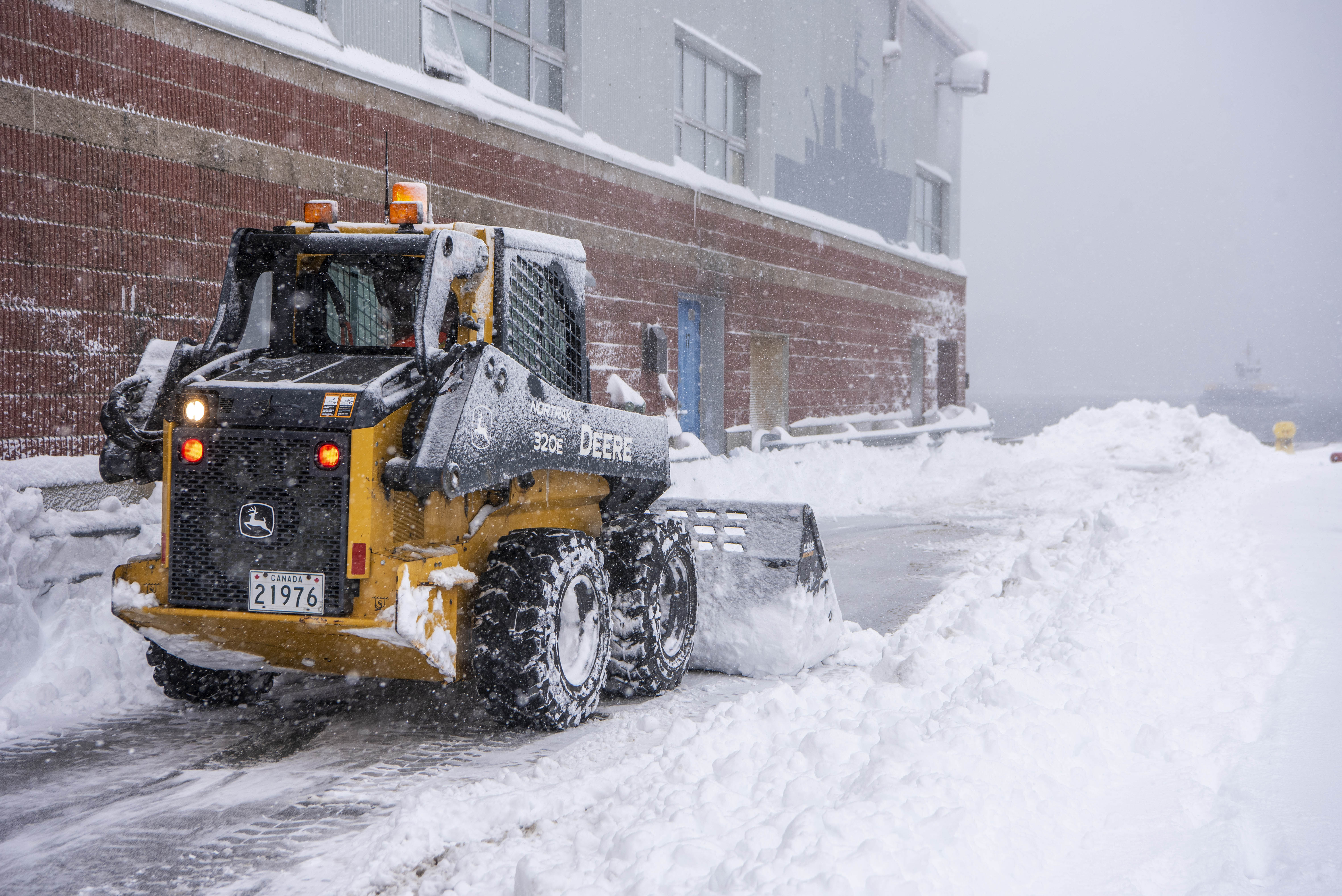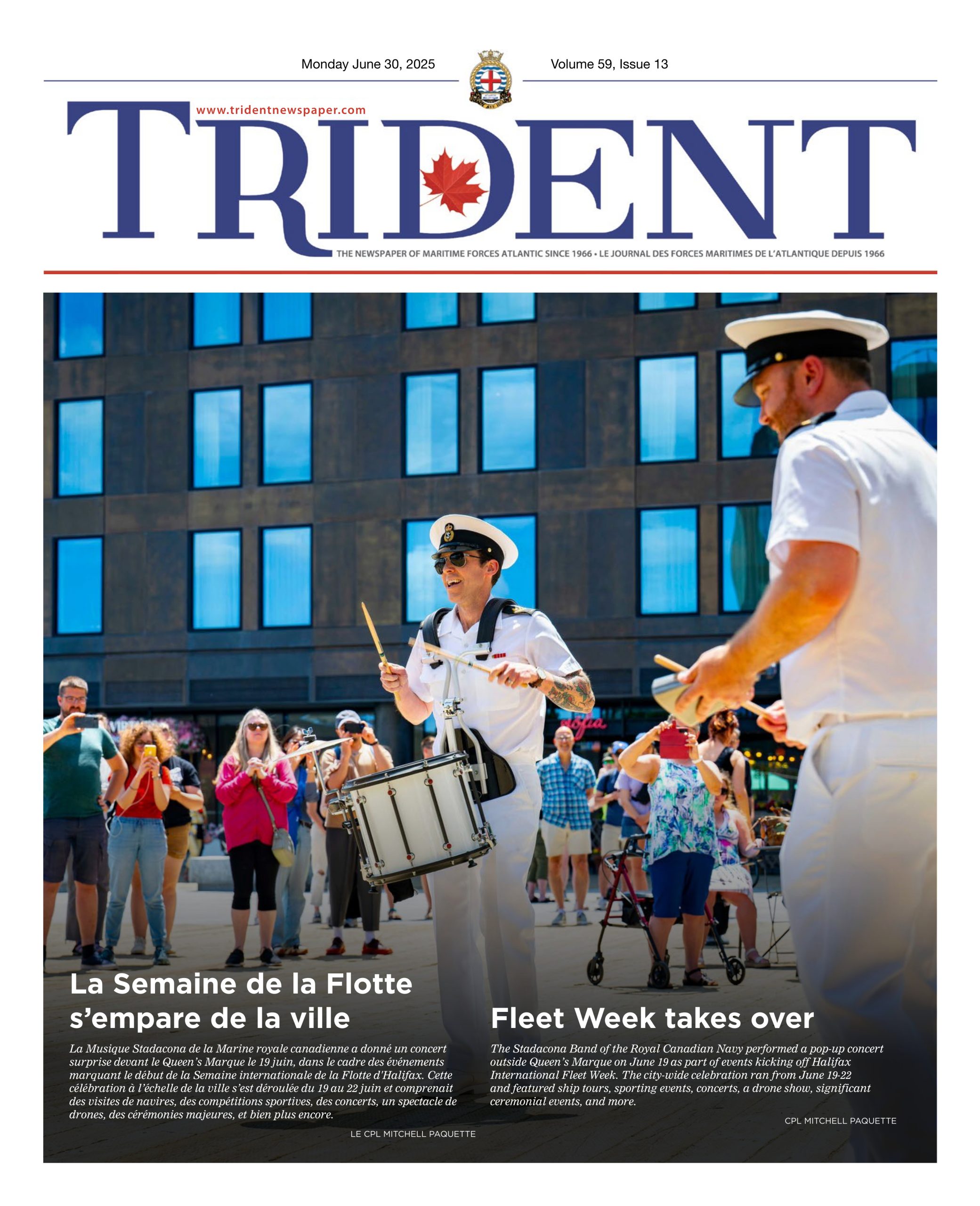Canadian Forces Base Halifax: Base openings, delayed openings and closures during adverse weather conditions
Frequently Asked Questions (FAQs)
CFB Halifax Storm Line (902-721-8325)
12 Wing Shearwater Storm Line (902-720-1305)
***WINTER SAFETY TIPS***
- Where can I find information regarding Base openings, delayed openings and closures?
Base opening, delayed opening or closure decisions are generally made by 5:30 a.m. (Atlantic) and communicated broadly – via storm lines (CFB Halifax: 902-721-8325; 12 Wing Shearwater: 902-720-1305*), social media channels (Facebook, Twitter (X) and Instagram) and MCAN email (if applicable) – by 6:00 a.m. (Atlantic) on the day of adverse weather conditions.
Given the complex, real-time nature of this decision-making process, weather forecasts that can change by the hour and the variety of stakeholders involved in/impacted by the decision, any announcement regarding a Base closure, opening or delayed opening cannot be made at an earlier time. Further, if the Base Commander decides to augment their decision, the Officer of the Day and the Base Public Affairs team will relay this change via the storm lines, MCAN email (if applicable) and CFB Halifax social media channels.
For Canadian Armed Forces (CAF) and Department of National Defence (DND) personnel who normally commence their travel prior to 6:00 a.m. (Atlantic) to be on time for work, if the weather is inclement, it is advisable to wait until 6:00 a.m. to confirm the status before beginning your travel. Knowing this timeline, you should communicate this delayed departure plan to your supervisor/Chain of Command in advance so there are no concerns on the morning of an inclement weather event.
*Please note that information provided through the 12 Wing Shearwater storm line (902-720-1305) and the 12 Wing RAVE notification system is only applicable to Royal Canadian Air Force units that fall under the authority of Commander 12 Wing. All other Defence Team members who work on Shearwater property should follow instruction provided via the CFB Halifax storm line and the CFB Halifax Facebook, Twitter and Instagram pages unless required on-site for the progression of critical or shift work, as identified by their Commanding Officers/supervisors.
- What is the process behind the Base Commander’s decision to open, delay the opening, or close the Base?
Generally, Canadian Forces Bases (CFB) across Canada do not close in the event of inclement weather. While Nova Scotia is prone to fluctuating weather patterns varying from one geographical location to the next, Base closures at CFB Halifax (as with other Bases and Wings) tend to be reserved for the most extreme weather conditions. A Base Commander’s decision to open, delay the opening or close CFB Halifax properties takes into consideration a multitude of interconnected factors, including.
- personnel safety;
- a recommendation from the Officer of the Day, which is based on consultations with the Meteorological and Oceanographic Center (METOC) and Base Snow and Ice Control (SNIC) team to assess current and future weather and road/sidewalk conditions on Base;
- Base operational readiness, with the goal of enabling the progression of critical work across the Maritime Forces Atlantic (MARLANT) Formation, where safe to do so, while remaining prepared to provide emergency assistance to Canadians; and
- the Base’s civic responsibility, which may involve ensuring its members remain off municipal and provincial roadways when widespread snow clearing or storm clean-up operations are in progress.
- What is the Base Commander’s responsibility when it comes to opening, delaying the opening of or closing the Base?
It is the Base Commander’s duty to keep the Base open to ensure its operational readiness at any given time, as any closures or delays impact the Base’s ability to serve and support our members, our Formation, the Royal Canadian Navy and the Canadian Armed Forces as a whole. This duty to remain operational may appear, at times, in direct conflict with the Base Commander’s responsibility to ensure the safety and security of Defence Team personnel and their families. This, however, is not the case.
- The Base Commander is responsible for deeming the Base open or closed to access for most Defence Team members based on daily conditions, however only 1,400 of the approximately 11,000 Defence Team members in the local area fall under their Chain of Command. This is why personnel are always encouraged to speak with their respective Chains of Command/supervisors prior to any inclement weather event if there are concerns with a safe and timely arrival to work.
- When it comes to Base openings, delayed openings and closures, it is important to note that the safety of our members is also the responsibility of senior leaders, supervisors and the members themselves. The Base Commander cannot make weather-based assessments on every individual Defence Team member’s safety and well-being, as the conditions vary greatly depending on members’ communities of residence. Defence Team personnel are expected to assess their own circumstances and discuss their ability to commute safely to work with their respective Chains of Command/supervisors prior to any adverse weather events.
- What does a “Base closure” really mean?
Although a Base closure may be announced due to adverse weather, it is important to note that Base properties are never 100% closed, as CFB Halifax must always ensure operational readiness and the provision of emergency and critical services to its on-site and live-in members at all times.
When the Base Commander “closes” the Base, it means that:
- the Base Commander is restricting any non-essential vehicular or pedestrian traffic on Base properties (this is often to ensure that the SNIC team can do its job safely and efficiently);
- personnel required on-site for the progression of critical work, as identified by their Commanding Officers, are to follow that instruction; and
- members employed in specific roles that cannot be left vacant (e.g. emergency services personnel, Network Operations Centre (NOC) personnel, cooks who provide food services to live-in members, etc.) will still be required to report for duty unless they have made alternate accommodations with their supervisors.
NOTE re: Shearwater closures: The Base Commander’s team is responsible for SNIC operations at 12 Wing Shearwater, however the Wing has its own Storm Line (902-720-1305) and its leadership may provide different direction depending on operational requirements. The Officer of the Day is in contact with 12 Wing Shearwater prior to consulting with the Base Commander on any decision regarding a Base closure, delayed opening or opening to ensure there is Command awareness of the Wing’s posture. See question 10 in this FAQ document for more information.
- What does a “Base delayed opening” really mean?
When a delayed opening of the Base is announced, it means that the Base is not ready to open to all members given current weather conditions, but that conditions across the region/on Base may change throughout the day to enable more widespread access. In these circumstances, the initial delayed opening notification will be released by 6 a.m. (Atlantic) via the Base storm lines, MCAN email (if applicable) and Base social media channels (Facebook, Twitter (X) and Instagram). Should there be a reassessment and the Base is to further delay opening or remain closed for the day, that change will generally be communicated approximately one (1) hour prior to the indicated opening time. For example, if the Base is delayed opening until 10:00 a.m., any reassessment will be communicated by 9:00 a.m. This timeline is necessary in order for the Base Commander to assess the real-time status of Snow and Ice Clearance (SNIC) operations on Base, municipal/provincial road conditions and other critical factors. In the absence of a reassessment, the Base will open as planned at the time indicated in the initial delayed opening message.
- What if the Base is open but the conditions still seem unsafe where you live and you don’t feel comfortable travelling to work?
CFB Halifax is a complex organization, with many Chains of Command operating within its vast geographical footprint. This is why members and their supervisors should be communicating well ahead of time regarding expectations to report to the physical workplace prior to a weather event. No one is expected to take unreasonable risks, and if you can’t make it to work safely, please reach out to your Chain of Command/supervisor to make alternate arrangements. That being said, Defence personnel are responsible to adhere to their hours of work in accordance with their collective agreements. Those who do not feel comfortable travelling to work and do not have remote work capability are responsible for contacting their supervisor. If personnel attempt to travel to work and weather conditions prevent them from arriving at the workplace, it is their responsibility to contact their supervisor, identify the situation and the efforts made to get to work. Further to this, managers/supervisors and leadership teams are:
- always encouraged to leverage their members’ work-from-home/remote work capabilities, where possible; and
- expected to clearly and pre-emptively communicate the requirement for identified personnel to report to the workplace if there is a need to progress critical, time-sensitive work, while allowing flexibility in scheduling due to prolonged commutes, family care conflicts and other such circumstances.
As noted in question 2, the Base Commander is making the decision to open based on a variety of factors including personnel safety, Snow and Ice Control (SNIC) operations, Base operational readiness and the decisions of municipal and provincial partners. Weather-based decisions cannot always be made given that local CAF/DND personnel reside in many different locations that often display drastically different weather patterns.
- As a supervisor or Chain of Command, what are my responsibilities when it comes to Base closures, openings, or delayed openings?
- Educate yourself on Base closures, openings and delayed openings by reading and keeping this FAQ document on-hand;
- Follow CFB Halifax on social media (Facebook-Instagram: @CFB.BFC.Halifax; Twitter (X): @CFB_BFCHalifax) for the latest storm updates;
- Have a pre-storm plan and communications strategy in place for your team;
- Get to know your team to foster an environment in which Defence Team members are comfortable raising their concerns with you;
- Be available to your team by sharing you contact information prior to adverse weather conditions and communicate with Defence Team members in a direct, timely manner;
- Leverage members’ work-from-home/remote work capabilities where possible; and
- Be flexible and understanding of employees’ needs and specific circumstances.
- As a Defence Team member, what are my responsibilities when it comes to Base closures, openings, or delayed openings?
- Educate yourself on Base closures, openings and delayed openings by reading and keeping this FAQ document on-hand;
- Speak with your supervisor prior to any inclement weather event if there are concerns with safe or timely arrival to work;
- Save the Base storm line contact information on your phone for quick access;
- Follow CFB Halifax on social media (Facebook-Instagram: @CFB.BFC.Halifax; Twitter (X): @CFB_BFCHalifax) for the latest storm updates; and
- Do not take unreasonable risks.
- How does the Base Snow and Ice Control team operate during a weather event?
Under the umbrella of Transport and Electrical Mechanical Engineering (TEME), a unit within the Base Logistics branch, Snow and Ice Control (SNIC) operations are conducted based on different service level priorities. During/after a snowfall, SNIC operators focus their efforts on Priority 1 areas, such as primary emergency routes on Base properties (e.g. firefighter routes) and other operationally essential surfaces. Once Priority 1 areas are clear, SNIC operators can then tackle Priority 2 areas, which consist of secondary emergency vehicle routes, access roads to petrol/oil/lubricant (POL) and ammunition storage areas, primary Base routes (including telecommunication site access roads) and multi-model sites storing dangerous cargo. Then, SNIC focuses on Priority 3 areas, such as secondary Base roads, parking lots and access roads to training areas. Despite many parking areas falling under the Priority 3 category, there is limited prioritized parking in effect when the Base is at minimum staffing or closed; this is in place to allow critical workers to access the Base while giving the SNIC team space and time to complete the clean-up of Base transit routes safely and efficiently. It is important to note that weather events trigger SNIC activities each time: if another storm hits while the first one is still being cleaned up, the clock is reset to zero and all SNIC operators must return to Priority 1 routes and restart the process to ensure emergency routes on Base properties remain accessible.
- Why can the 12 Wing Commander make closure, delayed opening or minimum staffing decisions the day prior to adverse weather conditions while the Base Commander makes the decision the morning of?
The 12 Wing Commander is responsible solely for 12 Wing operations, which means their decision to implement minimum staffing only impacts 12 Wing personnel; all of these personnel fall within their Chain of Command. The CFB Halifax Base Commander, alternately, is directly responsible for 1,400 military and civilian Defence Team members who work across the Base’s five branches. Yet their decision to open, delay opening or close the Base impacts 9,000+ additional Defence Team members who work across CFB Halifax properties but report through different Chains of Command (see question 2 in this FAQ document for more information).
For example, members working at Naval Fleet School (Atlantic), Canadian Forces Health Services Centre (Atlantic), 5th Canadian Division and FMF Cape Scott all fall within separate Command structures, meaning the Base Commander has very little control over these units’ operations and personnel. The CFB Halifax Base Commander is responsible for ensuring all local Defence properties (12 Wing included) remain operational, whether that be through snow removal operations, security services or the provision of information technology support. If the Base closes and any of these services cease, it can adversely impact the work of units outside of their immediate Chain of Command.
- Why do Bases sometimes remain open when other institutions (such as schools and daycares) close due to adverse weather conditions?
Canadian Forces Bases across the country are essential to our Defence establishment, ensuring the operational readiness of our CAF personnel and the provision of emergency services to Canadians. The Base Commander is aware of the stressors that come with school and daycare closures when the Base remains open. Base leadership, along with the larger Defence community, is continuing its efforts to institutionalize gender-based analysis plus (GBA +) and flexible work arrangements across its policies and operations and encourages all Defence Team members impacted by school and daycare closures to discuss mitigation measures with their Chain of Command/supervisors.
Nova Scotia schools and daycares are provincially mandated and regulated, while the CFB Halifax is regulated at the federal level, which makes for differing decision-making processes and operational priorities. Therefore, the decision to close or delay the opening of the Base will not always align with local schools and childcare services’ decision to close due to adverse weather conditions. As always, Chains of Command/supervisors should be always flexible and accommodating when dealing with Defence Team personnel who might struggle to secure childcare in the event of schools/daycares closing and the Base remaining open during a weather event.
NOTE: The Halifax & Region Military Family Resource Centre daycare in Shearwater–although located on Base property–will not always follow the Base Commander’s decision regarding closures, openings or delayed openings, which is why it is important to check directly with the H&R MFRC if that is your daycare service provider. You can follow them on Facebook (@HalifaxRegionMFRC), Twitter (@hrmfrc) and Instagram (@hrmfrc).
- If the Base is closed, am I still required to work if I have that capability to work remotely?
Generally, it is expected that those military and civilian employees who have the ability to telework should do so on days when they are unable to report to work on-site due to a Base closure or cannot make it to the workplace due to travelling conditions when Base is open. It is up to individual managers/supervisors to clarify this expectation to their employees in advance of any adverse weather event. For example, if a member is home with children, they may not be expected to work a full workday, or they may be without power and unable to access online resources. Some members–due to the nature of their work– are unable to work from home and therefore may not be required to work at all when the Base is closed. Examples of jobs that cannot be done from home include trades jobs (e.g. mechanics, welders, carpenters, etc.) and Auxiliary Vessel Crews. While this may seem unfair to some employees, it is the reality of working within a unique, diversified and multifaceted Defence community.
NOTE: Personnel required on-site for the progression of critical work, as identified by their Commanding Officers, are to follow that instruction.
OTHER RESOURCES/GUIDELINES
What is the Canadian Armed Forces (CAF) leave policy? Where can I find it?
The determination as to whether or not a Defence Team member has to take leave due to a weather event rests with the individual’s Chain of Command/supervisor. There are many options if a manager/supervisor or employee feels that it is unsafe for them to commute to the workplace. For information regarding the CAF leave policy, please consult the CF Leave Manual.
What is the Department of National Defence (DND) leave policy? Where can I find it?
The determination as to whether or not a Defence Team member has to take leave due to a weather event rests with the individual’s Chain of Command/supervisor. There are many options if a manager/supervisor or employee feels that it is unsafe for them to commute to the workplace. For civilian personnel, leave policies (e.g. family-related leave, 699 leave, etc.) are embedded within individual collective agreements. To browse collective agreements for the Public Service, click here. If you are unaware of which collective agreement applies to you, download the HR Go RH smartphone App to know more.
What are my responsibilities when interacting and commenting on CFB Halifax (or any other DND/CAF) social media channels?
As per the DND/CAF social media Terms and Conditions, the CFB Halifax social media administrators read comments and participate in discussions when appropriate.
We ask that your social media comments and inquiries remain respectful. Please note that we reserve the right to remove or hide comments that: contain personal, misleading, or incorrect information; express racist, hateful, sexist, homophobic, slanderous, insulting, or life-threatening messages; put forward serious, unproven, or inaccurate accusations against individuals or organizations; are aggressive, offensive, rude or abusive to an individual or an organization; and are contrary to the principles of the Canadian Charter of Rights and Freedoms. In short, please remain respectful and ensure that your comments are relevant to where they are posted.
The views of users commenting on our social media accounts do not necessarily represent the views of DND/CAF or the Government of Canada. For more information: Terms & Conditions | National Defence | Canadian Armed Forces.






